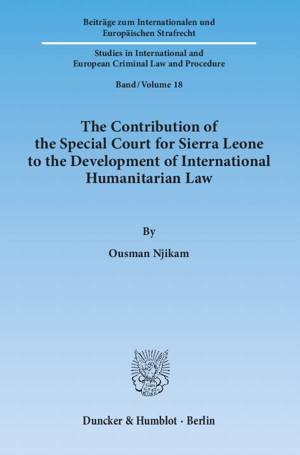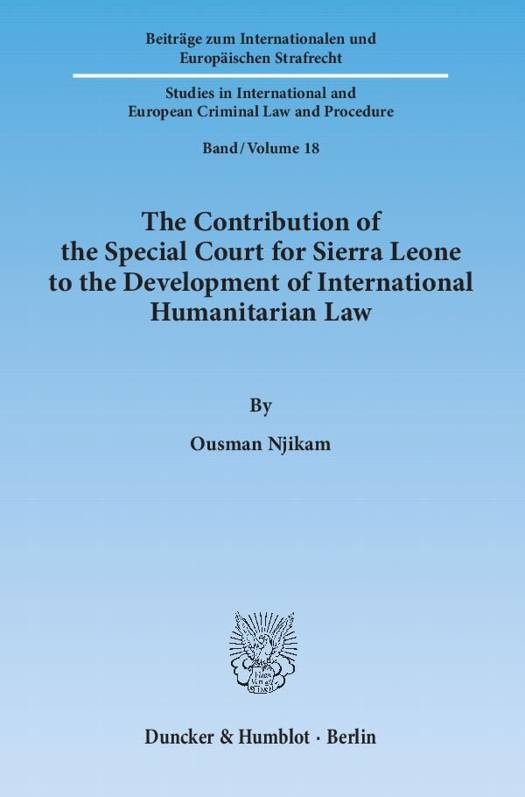
Bedankt voor het vertrouwen het afgelopen jaar! Om jou te bedanken bieden we GRATIS verzending (in België) aan op alles gedurende de hele maand januari.
- Afhalen na 1 uur in een winkel met voorraad
- Gratis thuislevering in België vanaf € 30
- Ruim aanbod met 7 miljoen producten
Bedankt voor het vertrouwen het afgelopen jaar! Om jou te bedanken bieden we GRATIS verzending (in België) aan op alles gedurende de hele maand januari.
- Afhalen na 1 uur in een winkel met voorraad
- Gratis thuislevering in België vanaf € 30
- Ruim aanbod met 7 miljoen producten
Zoeken
The Contribution of the Special Court for Sierra Leone to the Development of International Humanitarian Law
Ousman Njikam
€ 184,95
+ 369 punten
Omschrijving
The Special Court marked a new approach by the international community to violations of international humanitarian law. Its mode of creation i.e. through an agreement between the UN and the Government of Sierra Leone - as compared to the UN ad hoc Tribunals that were established pursuant to Chapter VII of the UN Charter - was a particularity of the Court. It is the only international court that possesses concurrent, primary and complimentary jurisdiction. The objective of this thesis is to provide a comprehensive analysis of the contribution of the Special Court to the development of international humanitarian law. Similar to its predecessors (ad hoc Tribunals), the Special Court consolidated the principle under international law of individual criminal responsibility.
Ousman Njikam evaluates the Special Court's mandate to »prosecute those who 'bear the greatest responsibility'« as being in itself a contribution to the development of international humanitarian law since the ICTY and ICTR at the time of their inception did not have this limitation rationae personae / prosecutorial discretion.
The author assesses some of the interesting and challenging issues dealt with such as the recruitment of child soldiers, amnesty for international crimes, head of state immunity and the crime of forced marriage. He concludes that the Special Court contributed albeit to a limited extent to the development of international humanitarian law.
Ousman Njikam evaluates the Special Court's mandate to »prosecute those who 'bear the greatest responsibility'« as being in itself a contribution to the development of international humanitarian law since the ICTY and ICTR at the time of their inception did not have this limitation rationae personae / prosecutorial discretion.
The author assesses some of the interesting and challenging issues dealt with such as the recruitment of child soldiers, amnesty for international crimes, head of state immunity and the crime of forced marriage. He concludes that the Special Court contributed albeit to a limited extent to the development of international humanitarian law.
Specificaties
Betrokkenen
- Auteur(s):
- Uitgeverij:
Inhoud
- Aantal bladzijden:
- 332
- Taal:
- Engels
- Reeks:
- Reeksnummer:
- nr. 18
Eigenschappen
- Productcode (EAN):
- 9783428139620
- Verschijningsdatum:
- 2/04/2013
- Uitvoering:
- Paperback
- Formaat:
- Trade paperback (VS)
- Afmetingen:
- 155 mm x 231 mm
- Gewicht:
- 4386 g

Alleen bij Standaard Boekhandel
+ 369 punten op je klantenkaart van Standaard Boekhandel
Beoordelingen
We publiceren alleen reviews die voldoen aan de voorwaarden voor reviews. Bekijk onze voorwaarden voor reviews.









